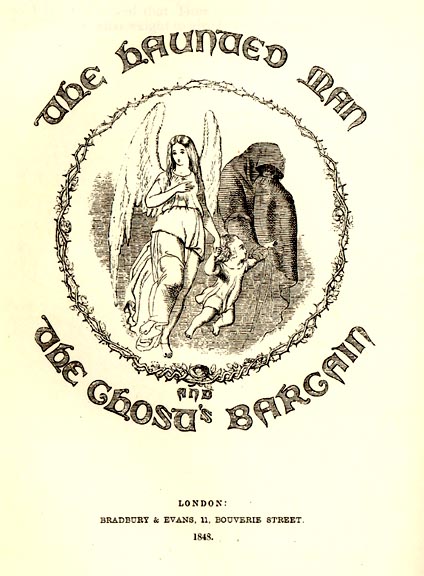The Man Who Reinvented Christmas: Dickens and the Spirits of Christmas
desireelong
«Previous page
•Page 1
•Page 2
•Page 3
You are here •Page 4 •Page 5 •Page 6 •Page 7 ♦Endnotes »Next page
You are here •Page 4 •Page 5 •Page 6 •Page 7 ♦Endnotes »Next page
1889
|
...
|

|
...
|

|
The Haunted Man and the Ghost’s Bargain is Dickens’ final independently published Christmas ghost story. Although it was relatively popular at its release in 1848, ironically, The Haunted Man seems to have quickly dwindled from public memory. It begins similar to Dickens’ other Christmas books – a lonely old man, Mr. Redlaw, sits by himself in front of his fire – yet the “ghost” of this story is not the spectre of someone long since deceased, but rather Redlaw’s own self in the form of a phantom doppelgänger. In addition to being undead, the spirit is also a familiar one to the protagonist. Redlaw is neither surprised nor terrified when he senses his phantom-self lurking behind his arm chair. The “ghost” of this tale offers to make a deal with the wallowing Mr. Redlaw – he will take away every memory of wrong and sorrow from him with the caveat that: |
The gift I have given you, you shall give again, go where you will. Without recovering yourself the power that you have yielded up, you shall henceforth destroy its like in all whom you approach. Your wisdom has discovered that the memory of sorrow, wrong, and trouble is the lot of all mankind, and that mankind would be happier, in its other memories, without it. Go! Be its benefactor! Freed from such remembrance, from this hour, carry involuntarily the blessing of such freedom with you. (Dickens 45)

Mrs. Williams decorating Redlaw's chambers
The Haunted Man and the Ghost's Bargain
|
For being a Christmas story, there is very little reference to the holiday in The Haunted Man. The reader knows it its winter from how the narrator introduces Mr. Redlaw, "there, upon a winter night, alone," but it is not until his servants arrive on the scene and the pure-hearted Mrs. Williams begins decorating his chambers with festive branches that we learn Christmas is nigh (Dickens 3). The ensuing conversation between Redlaw and the elderly Mr. Philip Williams reveals the theme of the story as they discuss the memories of Christmases past and how Redlaw would sooner forget all of his painful memories while Philip's most cherished possession- and secret to staying sharp at his age- are his memories, both good and bad. Aside from this interaction though there is very little holiday cheer in this story.
|

Mr. Redlaw in his chair with the "Ghost" behind
The Haunted Man and the Ghost's Bargain
|
|
Similar to both A Christmas Carol and The Chimes, the characters in The Haunted Man span from lower class to middle/upper-middle
class. Mr. Redlaw is at the top of the social ladder while the other
characters, such as the Williams, the Tetterbys and the poor orphan boy occupy
the lower rungs. Interestingly though, despite the obvious
social hierarchy of the characters, the story is not so much about
charity - as is the case with The Carol - but rather about the importance of remembering
past sorrows and wrongs and learning to forgive and show compassion towards
others who might be suffering.
According to the phantom's warning, Redlaw will pass on his "gift" to all whom he encounters; however, there are a couple exceptions to this rule. The amiable Mrs. Milly Williams and the orphan boy are unharmed by Redlaw's presence while others whom he encounters forget their past wrongs and in turn become bitter people. The orphan boy has not lived enough life to differentiate between wrong and right and thus has nothing to forget and Milly is the very picture of purity. In fact Milly acts as everyone's guardian angel and has learned the secret to forgiving and cultivating bad memories into reminders of the universality of pain, thus, Redlaw's gift cannot pass onto her either. |

Illustration of First Chapter
The Haunted Man and the Ghost's Bargain
|
At the story's conclusion we are reintroduced to the holiday season and reminded that Christmas is "a time in which...the memory of every remediable sorrow, wrong, and trouble in the world around us, should be active with us," and thus it is natural that these painful, yet necessary memories should be all the more strong and sacred during the holiday season as a reminder of forgiveness. On this note of moral platitude, Dickens ends his Christmas novella career and sets off on a rather different endeavor in publishing. Despite this change though, Dickens does not forsake his yuletide role, but rather transforms it into a format that best fits his new path - Christmas periodicals.

